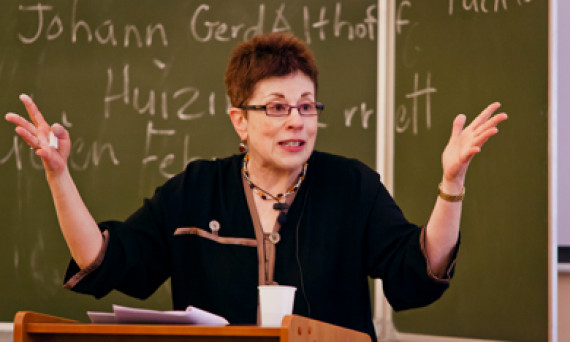Two views on the nature of emotion exist amongst researchers, psychologists, and neurologists. One is that emotions are universal, the same in every culture, and do not change with time. The other, on the contrary, supposes that emotion is culturally specific—volatile and closely related to language and the symbolic codes of society in which it exists. The history of emotion is developing in line with the latter view.
The history of emotion is a 20th century invention. Genealogically, Rosenwein’s work stems from Johan Huizinga, Lucien Febvre and Norbert Elias. Two trends can be distinguished within modern studies—political and institutional. Gerd Althoff (University of Munster) reinterprets the concept of medieval emotion as “childish” and uncontrollable. He believes that in this period emotions were ritual or symbolic actions whose meanings were easily read by other members of society. Thus, in our understanding, the king’s wrath does not testify to an outbreak of emotion, but was a traditionally required ritual. For William Reddy, emotions are a political phenomenon. He proposed the concept of emotional modes that correspond to political regimes. Reddy studies the period of the French Revolution, and points out that the emotional culture of the French court was a culture of emotional repression. Salon sentimentalism, appearing in the 18th century, was a revolt against this established emotional regime. In this approach, we can consider to French Revolution to be a revolution of emotions as well. The American researcher Peter Sterns has dedicated his work to the emotional norms of the American middle class. He has shown that in American society, control over one’s emotions is associated with an increase in productivity with economic and social benefits.
Barbara Rosenwein’s research focuses on emotional communities—groups of people who share common ideas about what emotions are, and in what situations and what ways they should be expressed. The basic emotional community is the family. Every family has its own rules and traditions for expressing emotion. As a specialist in the medieval period, Rosenwein cites the emotional associations of monastic communities, royal and princely courts, and urban communities.
For the historian, it is first and foremost necessary to define the emotional thesaurus of the study group. Grigorii Tursky, for example, uses about a hundred words to describe emotions in “The History of the Franks.” The may not seem like a lot, but as Rosenwein pointed out, modern American school children make due with about ten. In the emotional thesaurus, groups or an individual historic character usually have a central emotion or emotional situation around which the rest are organized. For Aquinas this is love, and for Grigorii Tursky, it is familial and brotherly feeling. Work on drafting a corpus of “emotional” words requires the historian’s utmost care, as concepts of emotion vary in different eras. For example, Aquinas considers the laziness of emotion to be associated with fear, which is different from the contemporary understanding of the phenomenon.
Professor Rosenwein does not see limitation in such specificity, but rather an indication of the direction of research. To answer the question of why a certain group is so unemotional or why such genres were selected for the expression of emotion can tell us a lot about the society being studied.
The history of emotions is interesting because it reveals a new dimension of the historical process. For medievalists, the study of emotions has allowed us to question the widespread notion of the absolute gap between the Middle Ages and the Early Modern Period. In the tradition started by J. Huizinga and N. Elias, historians have represented the Middle Ages as a time of uncontrolled displays of emotion, with public manifestations of anger and range. The Early Modern Period, in contrast, has been represented as imposing the civilizing bonds of self-discipline, control and restraint. According to Rosenwein, this view simplifies medieval society where very different emotional communities coexisted. Attention to emotions and the complexity of their expressions was no less than in the Early Modern Period.
Olga Yakushenko
Barbara Rosenwein (PhD (1974), B.A. (1966), University of Chicago)—Professor of History at Loyola University Chicago, where she has taught since 1974. As an historian of world renown, Rosenwein has taught world wide, including in France, the Netherlands, Great Britain, Spain, Germany, Israel, Sweden, Taiwan, and Australia. Her research interests include European medieval history, the history of emotion, monasticism, and immunities.











